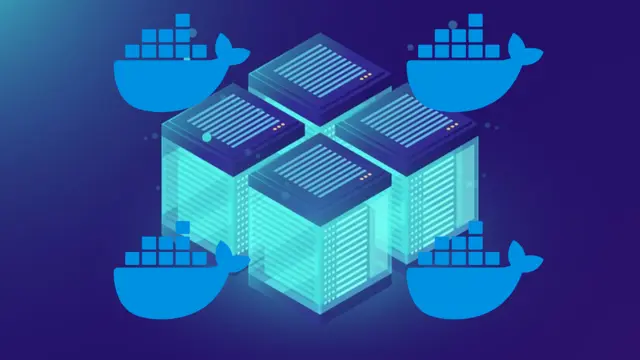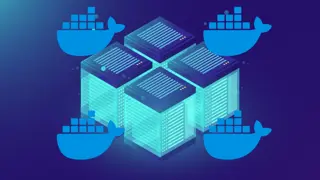
Docker: Build, Containerize, Deploy, and Scale Applications
Self-paced videos, Lifetime access, Study material, Certification prep, Technical support, Course Completion Certificate
Summary
- Reed Courses Certificate of Completion - Free
- Uplatz Certificate of Completion - Free
Add to basket or enquire
Overview
Uplatz offers this comprehensive course on Docker: Build, Containerize, Deploy, and Scale Applications. It is a self-paced course with video lectures. You will be awarded Course Completion Certificate at the end of the course.
Docker is a containerization platform that enables developers to package applications and their dependencies into lightweight, portable containers. These containers can run consistently across various environments, from development to production, eliminating the "it works on my machine" issue by standardizing the application's environment.
Docker simplifies and accelerates development, deployment, and scaling by standardizing applications in isolated, portable containers, making it a powerful tool for modern DevOps practices.
How Docker Works
Docker uses a client-server architecture, where the Docker client communicates with the Docker daemon to build, run, and manage containers. Here’s a breakdown of Docker’s workflow:
Dockerfile: A Dockerfile is a script containing a series of commands to assemble a Docker image. The image includes the app code, dependencies, environment settings, and OS libraries required to run the application.
Images: Docker images are read-only templates based on the Dockerfile instructions. They serve as a blueprint for creating containers.
Containers: Containers are running instances of Docker images. Each container is isolated, with its own CPU, memory, and network resources, yet lightweight because they share the host OS kernel.
Docker Engine: This is the runtime that enables containerized applications to operate on different platforms, providing isolation and resource management.
Docker Registry: Registries like Docker Hub allow users to store and share Docker images, making it easy to deploy applications across environments.
Key Features of Docker
Containerization: Packages applications and dependencies into isolated containers, ensuring consistency across environments.
Portability: Docker containers can run on any machine with Docker installed, regardless of underlying OS differences.
Version Control and Image Reusability: Docker images are versioned, enabling easy rollback and reusability across projects.
Efficient Resource Usage: Containers are lightweight and start quickly because they share the host OS kernel, making them more efficient than virtual machines.
Scalability and Orchestration Support: Docker works well with orchestration tools like Kubernetes, enabling the deployment of containerized apps at scale.
Isolation: Each container runs independently with its own isolated environment, which increases security and reduces dependencies conflicts.
CI/CD Integration: Docker integrates smoothly with continuous integration and deployment pipelines, automating testing and deployment for faster delivery.
Certificates
Reed Courses Certificate of Completion
Digital certificate - Included
Will be downloadable when all lectures have been completed.
Uplatz Certificate of Completion
Digital certificate - Included
Course Completion Certificate by Uplatz
Curriculum
Course media
Description
Docker - Course Syllabus
1. Introduction
- Microsystem & Containerization
- Challenges with Deployments
- What is Virtualization
- Problems with Virtualization
- Containerization Introduction
- What is Docker
- Docker Features
- Applying the Solution with Docker
2. Docker Installation
- Install Docker
- Start Docker Service
- Stop Docker
- Uninstall Docker
- ECS Introduction
3. Docker Architecture
- Docker Client
- Docker Engine
4. Dockerfile
- Writing Dockerfile
- Creating Dockerfile
- Visual Source Code IDE
- Understanding the Instructions used in Dockerfile:
- FROM
- MAINTAINER
- COPY
- ADD
- RUN
- CMD
- ENTRYPOINT
- VOLUME
5. Docker Images
- Understanding the Base Image
- Image Layered Structure
- Internals of Docker Image
- Build Process of Docker Images
- Tagging the Images
- Image Generation with Docker Commit
- Run, Inspect, Remove, and Prune Images
6. Docker Hub
- Docker Hub Account Creation
7. Docker Commands
- docker version
- docker info
- docker help
- docker images
- docker pull
- docker rmi
- docker ps
- docker login
- docker push
- docker rm
8. Docker Containers
- Running Docker Containers from Images
- Listing Running Containers
- Container Lifecycle
- Start, Stop, and Restart Containers
- Removing the Containers
- Container with Dependencies (Multi Containers)
- Starting Containers in Shell
- Running Containers in Bash Mode Using IT Flag
- Container Isolation
9. Docker Volume
- Advantages
- Bind Mounts
- Volumes Over Bind Mounts
- Creating Volumes
- List All Volumes
- Run Container on Volumes
- Remove Volumes
10. Docker Compose
- Installation
- Docker Compose File
- Check the Validity of the File
- Run Docker Compose
- Stop Docker
- Scale the Containers
11. Docker Swarm
- Container Orchestration
- Features of Docker Swarm
- Docker Swarm Node Manager
- Create Worker Nodes
- Run Containers on Swarm
- Scaling the Services
Who is this course for?
Software Developers: Developers who want to learn how to containerize applications, streamline development workflows, and ensure consistency across environments.
DevOps Engineers: Professionals responsible for deploying, managing, and scaling applications in production environments who want to leverage Docker for container orchestration and automation.
System Administrators: IT professionals who manage infrastructure and want to adopt containerization to improve resource utilization and simplify deployment processes.
Cloud Engineers: Individuals working with cloud platforms who want to use Docker to build and deploy scalable, cloud-native applications.
IT Professionals: Those looking to modernize their skill set by learning containerization technologies and best practices.
Students and Enthusiasts: Learners interested in understanding Docker and containerization as part of their journey into software development, DevOps, or cloud computing.
Technical Leads and Architects: Professionals designing systems who want to incorporate Docker into their architecture for better scalability, portability, and efficiency.
Startups and Small Teams: Teams looking to adopt Docker to improve development speed, reduce overhead, and scale applications cost-effectively.
Requirements
Passion & determination to achieve big goals in life!
Career path
- DevOps Engineer
- Cloud Engineer
- Software Engineer
- Platform Engineer
- Infrastructure Engineer
- Site Reliability Engineer (SRE)
- Solutions Architect
- Systems/Linux Administrator
- Build and Release Engineer
- Data Scientist (for model deployment and environment management)
- Security Engineer
- Backend Developer
- Full-Stack Developer
- QA Engineer
- Network Engineer
- IT Operations Manager
- Technical Support Engineer
Questions and answers
Currently there are no Q&As for this course. Be the first to ask a question.
Reviews
Currently there are no reviews for this course. Be the first to leave a review.
Provider
Uplatz is leading global provider of IT & Technology training.
We have a strong network of qualified and experienced tutors. Uplatz provides training on cutting-edge technologies such as Data Science, Machine Learning, AWS, Microsoft Azure, Google Cloud, IBM Cloud, Data Engineering, Python, R, Java, SAP, Oracle, SAS, Salesforce, Web Development Stack, JavaScript, ReactJS, AngularJS, NodeJS, JSP & Java Servlets, MongoDB, BI Tools such as Tableau, Spotfire, Power BI, DW & ETL tools such as Informatica, IBM DataStage, Talend, DevOps, Project Management, Software Testing, and many more.
We provide training courses in both online formats - 1) live tutor-led, 2) self-paced videos
We feel proud to say that we are making learning affordable by keeping prices of all our courses very low. Our course prices are listed at almost 90% discounted rate from average market price.
Our Vision
- To become a global leader in the learning sector by providing training on job-oriented technologies
Our Mission
- To provide high-quality training on industry-demanded technologies
- To make learning affordable for the masses by keeping our prices extremely low
- To help our talented students get a high-paying job in the market
Will I get a Certificate of Course Completion?
Course Completion Certificate is awarded by Uplatz
What are your top courses?
- Data Science
- Machine Learning
- Cloud Computing - AWS, Azure, Google Cloud, IBM Cloud, and more
- Data Engineering
- SAP modules such as S/4HANA Finance, EWM, TRM, FICO, BPC, HCM, WM, MM, PP, PM, QM, SD, TRM, SuccessFactors, UI5 and Fiori, S/4HANA Logistics, TM, etc.
- Oracle
- SAS
- Salesforce
- BI Tools - Tableau, Power BI, Spotfire, MicroStrategy, etc.
- DW & ETL Tools - Informatica, Talend, IBM DataStage, etc.
- Project Management & DevOps
- Software Testing
- Digital Marketing & SEO
Will I be provided study material, tutor notes and practice assignments?
Uplatz provides tutor notes, practice assignments, practice sessions, and a lot of useful study material for free. This will help you in job interviews and certification exams.
In case of tutor-led online training, will I have access to the recorded sessions?
Yes. All live classes get recorded and life-time access on the recordings is provided.
Course Search and Enrollment
Simply search the course of your choice! We have a portfolio of more than 1000 courses with the premium ones highlighted clearly. Just search for the course that you want to take or simply use our online course finding tool to help you choose the best courses as per your needs and market demand.
Uplatz differentiates itself by providing extremely affordable learning to all and that too in the comfort of their homes.
Just contact us for a customized quote, your preferable timings, your affordability, and we'll work out the best course for you that will provide you not only a great return on investment but also to help you get a job with a premium salary. We'll also get you prepared for the certification exams.
Legal information
This course is advertised on Reed.co.uk by the Course Provider, whose terms and conditions apply. Purchases are made directly from the Course Provider, and as such, content and materials are supplied by the Course Provider directly. Reed is acting as agent and not reseller in relation to this course. Reed's only responsibility is to facilitate your payment for the course. It is your responsibility to review and agree to the Course Provider's terms and conditions and satisfy yourself as to the suitability of the course you intend to purchase. Reed will not have any responsibility for the content of the course and/or associated materials.

